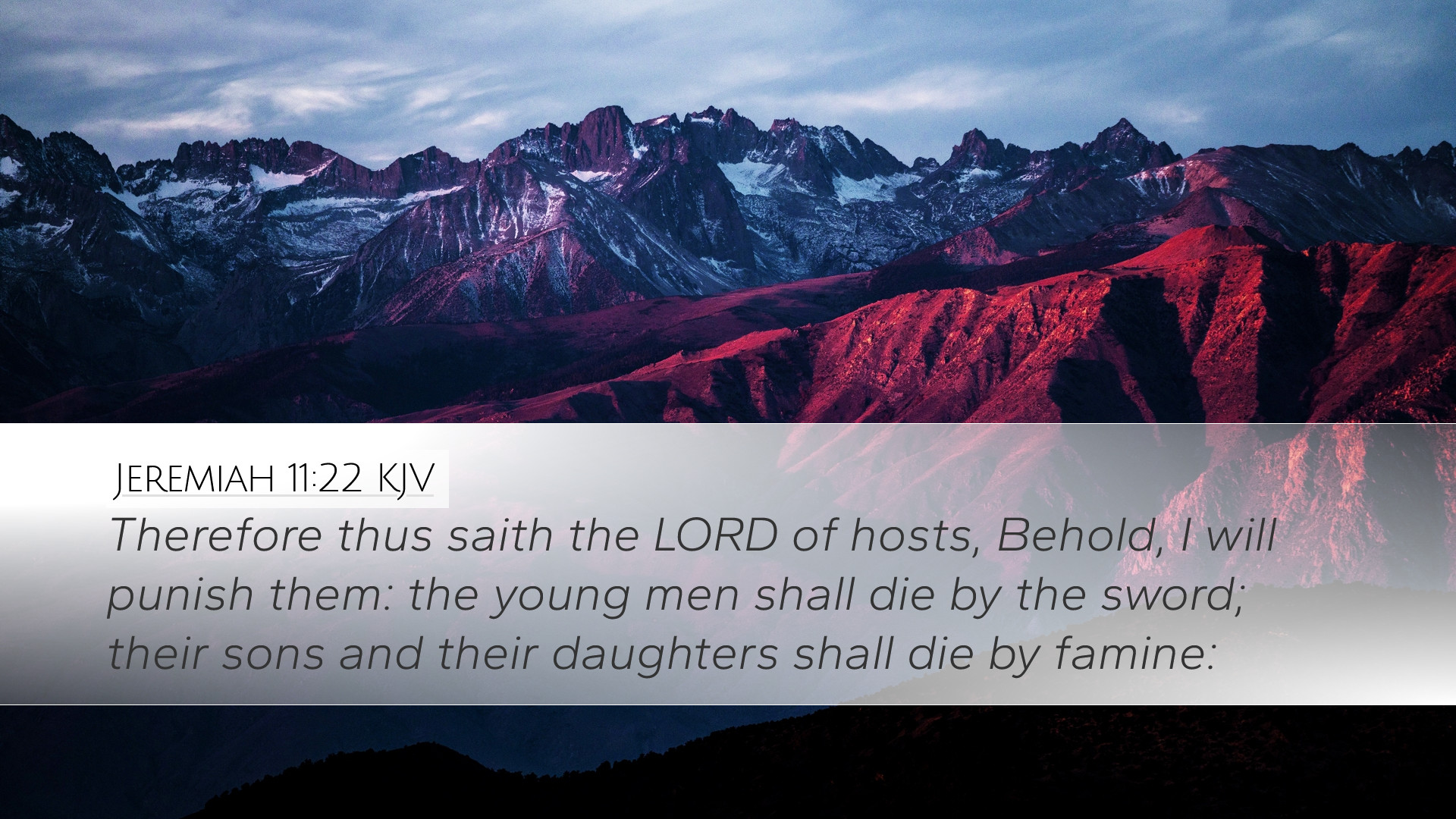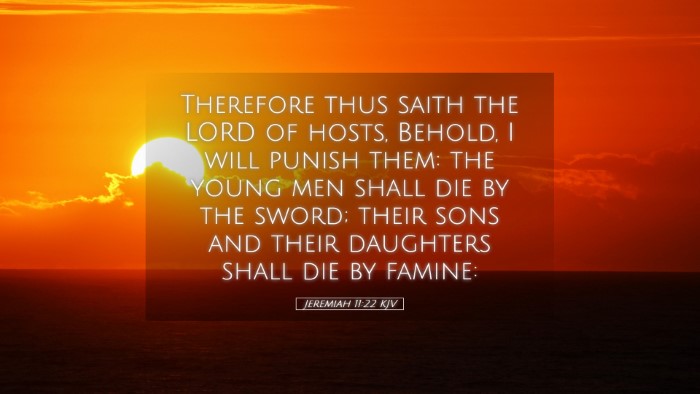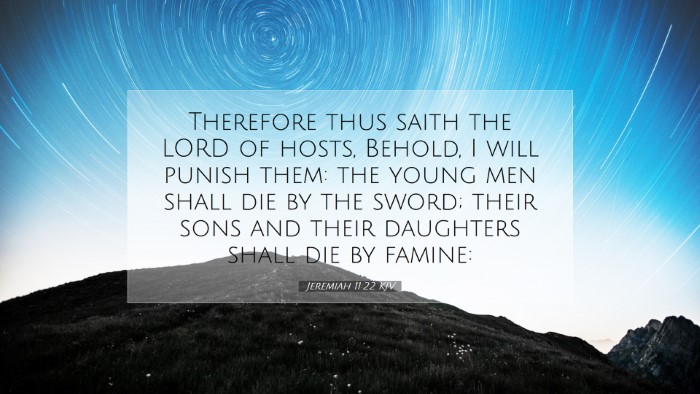Commentary on Jeremiah 11:22
Jeremiah 11:22 states: "Therefore thus saith the Lord of hosts, Behold, I will punish them. The young men shall die by the sword; their sons and their daughters shall die by famine."
This verse serves as a stark reminder of the consequences of disobedience and rebellion against God. As we delve into the commentaries provided by esteemed theologians Matthew Henry, Albert Barnes, and Adam Clarke, we will explore the meanings, implications, and theological reflections surrounding this profound warning from the Lord.
Contextual Overview
To fully grasp the weight of Jeremiah 11:22, it is vital to understand the surrounding context of the prophet's message. Jeremiah was called to prophesy during a time of great moral and spiritual decline in Judah. His warnings were directed towards a people who had persistently violated their covenant with God, embracing idolatry and injustice.
Insights from Matthew Henry
Matthew Henry, in his commentary, emphasizes the severity of God's judgment laid out in this verse. He notes:
-
Divine Retribution: Henry highlights that the phrase "I will punish them" reflects God's commitment to uphold justice. He underscores the inevitability of divine retribution for those who defy God's commandments.
-
The Young Men’s Fate: The mention of young men dying by the sword indicates the violent consequences that await those who lead their communities astray. Henry points out that leadership carries a weighty responsibility, and the young men, often seen as future leaders, face dire consequences if they don’t align with God’s purposes.
-
Effects on Families: The reference to sons and daughters dying by famine invokes a sense of tragedy that extends beyond individuals to families and communities. Henry articulates the idea that societal sin affects the well-being of future generations, thus urging the need for corporate repentance.
Reflections from Albert Barnes
Albert Barnes provides a more historical perspective in his commentary. He highlights:
-
Historical Context: Barnes elucidates the backstory of Judah at this time, affirming that this warning came as the Babylonian threat loomed. He notes that the prophecy acted as a forewarning for the people to cease their idolatrous practices and turn back to the Lord.
-
Symbolism of the Sword and Famine: The sword signifies both a physical and spiritual assault on the people, indicative of divine judgment. Famine symbolizes lack—both of physical sustenance and spiritual nourishment that comes from a relationship with God. Barnes stresses that these punishments were not arbitrarily inflicted but were consequences of the people's choices.
-
Call to Awareness: Barnes calls the readers to an awareness of the seriousness of sin and the connectedness of societal health to adherence to God’s statutes. The implication is clear: societal sin results in collective consequences.
Insights from Adam Clarke
Adam Clarke offers an in-depth theological examination of this verse, reflecting on:
-
God's Sovereignty and Judgment: Clarke insists that God's sovereignty is evident in His ability to judge nations. He portrays God’s judgments as a necessary response to persistent injustice, reinforcing that God is not indifferent to the actions of His people.
-
Punishment as a Means of Restoration: Clarke emphasizes that while God’s punishment seems severe, it serves a purpose—restoration of the people. The harsh reality of death and famine is portrayed as both a consequence of sin and an avenue for eventual redemption.
-
Theological Implications: Clarke also touches on the theological implications of corporate and individual responsibility. He encourages readers to consider how personal relationships with God influence broader community dynamics and stresses the need for repentance not just at the individual level but collectively as a nation.
Theological Reflections
This verse and its commentary captivate us with crucial theological reflections:
-
Sin and Judgment: Sin has real consequences, both personally and communally. Such dire warnings should provoke deep self-examination among pastors, theologians, and laypeople alike, emphasizing the need for vigilance against sin in both personal and societal contexts.
-
Impact on Future Generations: The emphasis on the fate of sons and daughters urges contemporary readers to consider how their actions and spiritual health impact future generations. The repercussions of today's spiritual decisions can echo into tomorrow.
-
Hope for Restoration: Despite the grim nature of God's judgment, there exists a thread of hope throughout the prophetic writings. God's desire is not merely to punish but to reconcile—a call to return to His ways and find restoration in Him.
Conclusion
Jeremiah 11:22 provides a concise, yet profound insight into the dynamics of human disobedience and divine retribution. Drawing from the commentaries of Matthew Henry, Albert Barnes, and Adam Clarke, it is evident that this scripture stands as a timeless reminder of the serious nature of our covenant with God. In an age that often overlooks the weight of sin, this verse calls us back to a faithful walk with God, urging both personal and collective repentance and restoration.


